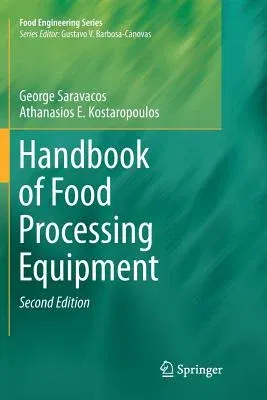This text covers the design of food processing equipment based on key
unit operations, such as heating, cooling, and drying. In addition,
mechanical processing operations such as separations, transport,
storage, and packaging of food materials, as well as an introduction to
food processes and food processing plants are discussed.
Handbook of Food Processing Equipment is an essential reference for
food engineers and food technologists working in the food process
industries, as well as for designers of process plants. The book also
serves as a basic reference for food process engineering students.The
chapters cover engineering and economic issues for all important steps
in food processing. This research is based on the physical properties of
food, the analytical expressions of transport phenomena, and the
description of typical equipment used in food processing. Illustrations
that explain the structure and operation of industrial food processing
equipment are presented.
style="font-size: 13.3333330154419px;">The materials of construction
and fabrication of food processing equipment are covered here, as well
as the selection of the appropriate equipment for various food
processing operations. Mechanical processing equipment such as size
reduction, size enlargement, homogenization, and mixing are discussed.
Mechanical separations equipment such as filters, centrifuges, presses,
and solids/air systems, plus equipment for industrial food processing
such as heat transfer, evaporation, dehydration, refrigeration,
freezing, thermal processing, and dehydration, are presented. Equipment
for novel food processes such as high pressure processing, are
discussed. The appendices include conversion of units, selected
thermophysical properties, plant utilities, and an extensive list of
manufacturers and suppliers of food equipment.

